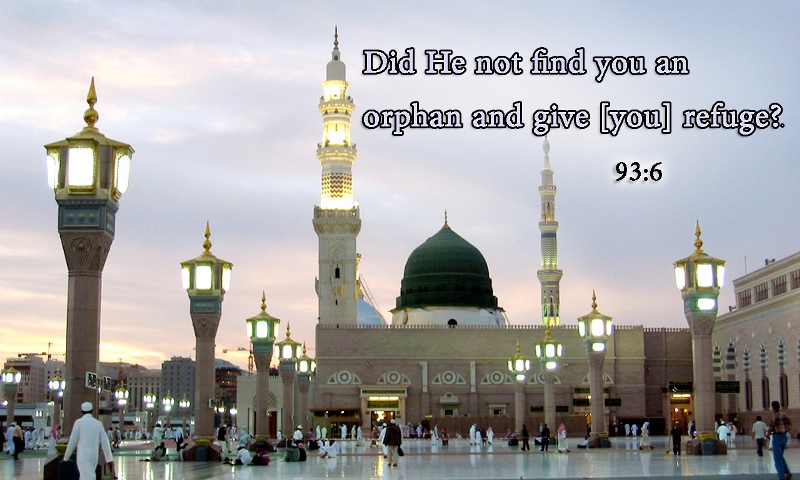Being an orphan and growing up in poverty formed the Prophet’s character and helped him to bear the difficulties of the Prophecy and deal with his opponents. Although he became the leader of Muslim in Median, he never forgot the orphans and the needy people.

The Prophet (P) grew up in hardship as he was an orphan who lost his parents and grandfather during his childhood. The holy Qur’an narrates the status of the Prophet in chapter Az-Zuha. [1] It was, indeed, Allah’s will that he must experience hard situations, so he had been strong enough to accomplish his duty as the last Messenger of God.
In fact, these hard events had positive effects on the Prophet's character. The events taught him some great lessons. The first lesson was that he learned to rely and depend on God instead of relying on the people. Also, the loneliness taught him to apply his potential. The loneliness flourished his innate characteristics and featured his abilities and qualities, and taught him to be independent.
These experiences, also, made him watch over the underprivileged and the needy during his lifetime. Abu Talib, the prophet’s uncle, in his poem called him “the spring for the orphans” [2] which shows how he cared very much about the people in need especially the orphans.
He also had the opportunity of living among the Bedouin as it was the general custom of the wealthy Arabs to send their children away to Bedouin nurses so that they might grow up in the free and healthy surroundings of the desert whereby they would develop a robust frame and acquire the pure speech and manners of the Bedouins. [3]
The Prophet (P) was entrusted to Halimah Sadiyah, a lady from the Banu Sa’ad clan of the Hawazin tribe, where the prophet (P) grew up and became physically and mentally strong. Halimah narrated that how her family’s status positively changed and Allah's bounty, abundantly, bestowed upon them by the arrival of the infant in the clan. [4]
Indeed, his difficult and lonely childhood prepared him for the hardships of the prophecy. During twenty three years, as the Last Prophet, he tolerated many difficulties and hardships. The holy Qur’an acknowledges some of the Prophet’s characteristics which imply what a kind and humane heart and an exemplary character he had as the holy Quran says: “There has certainly come to you a Messenger from among yourselves. Grievous to him is what you suffer; [he is] concerned over you [i.e., your guidance] and to the believers is kind and merciful.”[5]
Notes:
[1] Chapter 93, verse 6. أَلَمْ يجِدْكَ يتِيمًا فَآوَى
[2] Tabari, Jame Al-Bayan, Vol 7. P 228
[3] Sirihi Halabiyih, Vol. 1, p.99.
[4] Bihar ul-Anwar, Majlesi, Vol. 15, pp.331-395; Sirihi ibn Hisham, Vol 1. pp.159-60; Sirihi Halabiyih, Vol. 1, p.99
[5] Chapter 9, verse 128. لَقَدْ جَاءَكُمْ رَسُولٌ مِنْ أَنْفُسِكُمْ عَزِيزٌ عَلَيهِ مَا عَنِتُّمْ حَرِيصٌ عَلَيكُمْ بِالْمُؤْمِنِينَ رَءُوفٌ رَحِيمٌ



